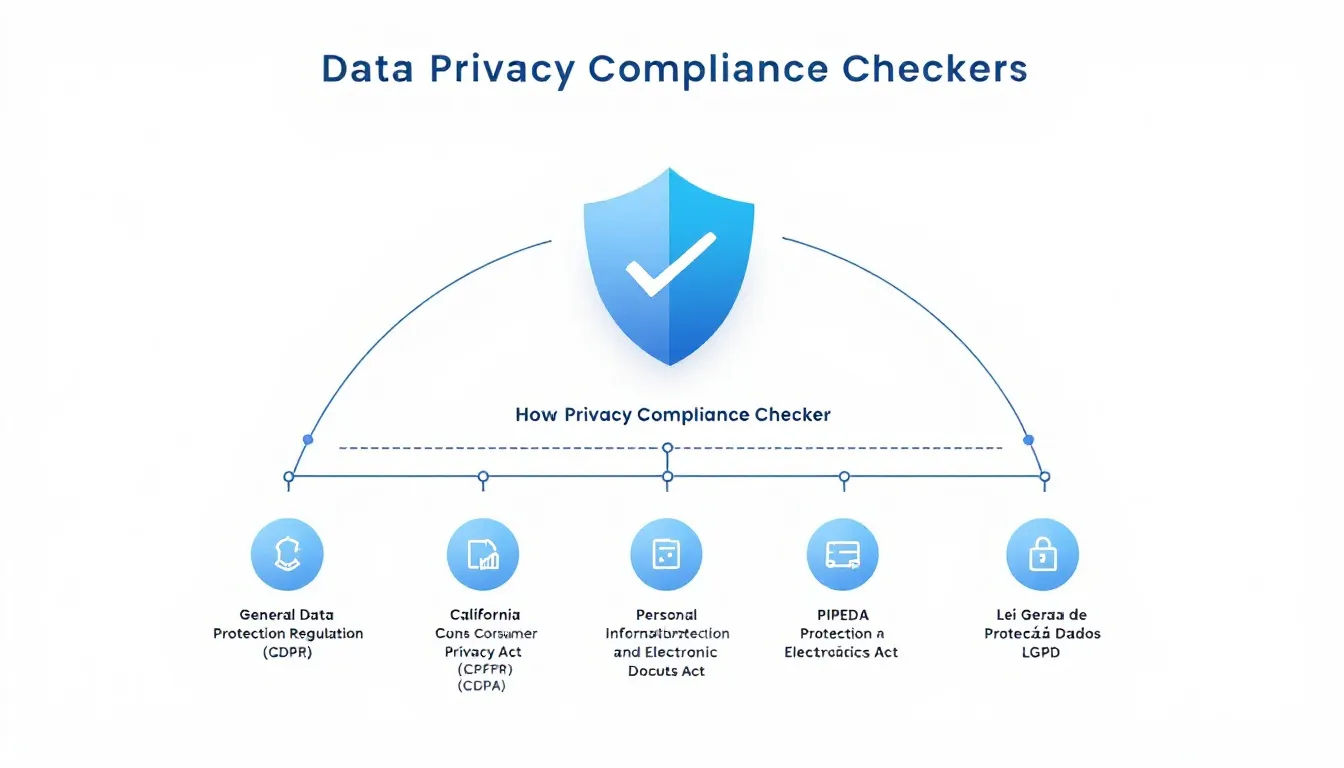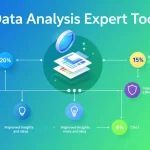Data Privacy Compliance Checker
Is this tool helpful?
How to Use the Data Privacy Compliance Checker Effectively
The Data Privacy Compliance Checker is a powerful tool designed to help organizations assess their compliance with various data privacy regulations. To use this tool effectively, follow these steps:
- Business Location: Enter the primary country or region where your business operates. For example, you might enter “United Kingdom” or “European Union”.
- Data Subjects’ Location: List the countries or regions where your data subjects reside, separated by commas. For instance, you could enter “United States, Canada, Germany, Japan”.
- Types of Personal Data Collected: Specify the categories of personal data you collect. This could include “email addresses, phone numbers, browsing history, purchase records”.
- Purpose of Data Collection: Describe why you collect and process personal data. An example could be “customer support, product recommendations, analytics”.
- Consent Mechanism (Optional): If applicable, explain how you obtain consent from data subjects. You might enter “Double opt-in email confirmation, cookie consent banner”.
- Data Security Measures (Optional): List the security measures you have in place to protect personal data. For example, “256-bit encryption, multi-factor authentication, regular security audits”.
- Third-Party Sharing (Optional): Provide information about any third parties you share data with. This could be “cloud storage providers, payment processors, marketing analytics services”.
- Preferred Language (Optional): Select your preferred language for the assessment results. You might choose “French” or “Spanish”.
After filling in the required information, click the “Check Compliance” button to generate your assessment. The tool will analyze your inputs and provide a detailed compliance report based on relevant data protection regulations.
Understanding Data Privacy Compliance: Definition, Purpose, and Benefits
Data privacy compliance refers to the adherence to laws, regulations, and best practices that govern the collection, processing, storage, and protection of personal data. In today’s digital landscape, where data breaches and privacy concerns are increasingly common, ensuring compliance with data protection regulations has become a critical aspect of business operations.
Purpose of Data Privacy Compliance
The primary purposes of data privacy compliance are:
- Protecting individuals’ rights and freedoms concerning their personal data
- Establishing trust between organizations and their customers or users
- Preventing unauthorized access, use, or disclosure of sensitive information
- Maintaining the integrity and confidentiality of personal data
- Ensuring transparency in data processing activities
Benefits of Prioritizing Data Privacy Compliance
Organizations that prioritize data privacy compliance can enjoy numerous benefits:
- Enhanced Customer Trust: Demonstrating a commitment to data protection builds confidence among customers and stakeholders.
- Competitive Advantage: In an era where privacy concerns are paramount, compliance can set a business apart from its competitors.
- Risk Mitigation: Proper compliance reduces the risk of data breaches and associated legal and financial consequences.
- Improved Data Management: Compliance efforts often lead to better data organization and more efficient data processing practices.
- Global Business Opportunities: Meeting international data protection standards enables businesses to operate across borders more easily.
Benefits of Using the Data Privacy Compliance Checker
The Data Privacy Compliance Checker offers several advantages for organizations seeking to navigate the complex landscape of data protection regulations:
1. Comprehensive Assessment
The tool provides a thorough evaluation of your data handling practices across multiple jurisdictions. It considers various aspects of data privacy, including:
- Consent mechanisms
- Data subject rights
- Cross-border data transfers
- Data security measures
- Third-party data sharing
2. Time and Cost Efficiency
Conducting a manual compliance assessment can be time-consuming and expensive. This tool streamlines the process, allowing you to:
- Quickly identify potential compliance gaps
- Prioritize areas that require immediate attention
- Reduce the need for extensive legal consultations in the initial assessment phase
3. Tailored Recommendations
Based on your inputs, the Data Privacy Compliance Checker generates customized recommendations to improve your compliance posture. These may include:
- Suggestions for enhancing consent mechanisms
- Guidelines for implementing data subject access requests (DSARs) procedures
- Recommendations for strengthening data security measures
- Advice on updating privacy policies and terms of service
4. Multi-Regulatory Compliance
The tool is designed to assess compliance with multiple data protection regulations, including:
- General Data Protection Regulation (GDPR)
- California Consumer Privacy Act (CCPA)
- Personal Information Protection and Electronic Documents Act (PIPEDA)
- Lei Geral de Proteção de Dados (LGPD)
This multi-regulatory approach ensures that organizations operating across different jurisdictions can comprehensively evaluate their compliance status.
5. Continuous Improvement
By regularly using the Data Privacy Compliance Checker, organizations can:
- Track their progress in addressing compliance issues
- Stay updated on evolving regulatory requirements
- Demonstrate a commitment to ongoing privacy enhancement
Addressing User Needs and Solving Specific Problems
The Data Privacy Compliance Checker is designed to address several key challenges faced by organizations in the realm of data protection:
1. Regulatory Complexity
Problem: The global landscape of data protection regulations is complex and constantly evolving, making it difficult for organizations to stay compliant.
Solution: The tool simplifies compliance assessment by analyzing user inputs against the requirements of multiple regulations. For example, if a user indicates they collect data from EU residents, the tool will automatically include GDPR-specific compliance checks in the assessment.
2. Resource Constraints
Problem: Many organizations, especially small and medium-sized enterprises (SMEs), lack the resources to conduct comprehensive compliance audits.
Solution: By providing a quick and accessible assessment, the Data Privacy Compliance Checker allows organizations to get a high-level overview of their compliance status without significant time or financial investment. This enables them to focus their resources on addressing the most critical compliance gaps.
3. Cross-Border Data Transfers
Problem: Organizations operating internationally face challenges in managing cross-border data transfers compliantly.
Solution: The tool considers the locations of both the business and the data subjects to provide targeted advice on cross-border data transfer requirements. For instance, if a US-based company collects data from EU residents, the tool will highlight the need for appropriate data transfer mechanisms like Standard Contractual Clauses (SCCs).
4. Data Subject Rights Management
Problem: Implementing processes to handle data subject rights (e.g., right to access, right to be forgotten) can be complex.
Solution: Based on the types of data collected and the applicable regulations, the tool provides specific recommendations for implementing data subject rights processes. For example, it might suggest implementing a user-friendly online portal for submitting and managing data subject requests.
5. Consent Management
Problem: Obtaining and managing valid consent for data processing activities is a critical requirement under many privacy laws.
Solution: The Data Privacy Compliance Checker evaluates the described consent mechanisms against regulatory requirements. If a user indicates they use pre-ticked checkboxes for consent, the tool would flag this as non-compliant with GDPR and suggest implementing an active opt-in process instead.
Practical Applications and Use Cases
The Data Privacy Compliance Checker can be applied in various scenarios across different industries. Here are some practical use cases:
1. E-commerce Startup
Scenario: A new e-commerce platform plans to launch its services globally, starting with customers in the US, EU, and Canada.
Application: The startup uses the compliance checker to:
- Identify which regulations apply to their operations (GDPR, CCPA, PIPEDA)
- Assess their planned data collection practices against these regulations
- Receive guidance on implementing appropriate consent mechanisms for different jurisdictions
- Get recommendations for structuring their privacy policy and terms of service
2. Healthcare Provider
Scenario: A healthcare provider is expanding its telemedicine services to serve patients across multiple states in the US.
Application: The provider utilizes the tool to:
- Evaluate compliance with HIPAA requirements
- Assess the security measures in place for protecting patient data
- Receive guidance on obtaining proper consent for telehealth services
- Identify any state-specific data protection requirements that may apply
3. Multinational Corporation
Scenario: A large corporation with offices in the US, EU, and Brazil is conducting an annual privacy compliance audit.
Application: The corporation uses the compliance checker to:
- Perform a gap analysis against GDPR, CCPA, and LGPD requirements
- Evaluate their current data transfer mechanisms for cross-border data flows
- Assess the adequacy of their data breach notification procedures
- Identify areas where their global privacy program can be strengthened
4. Educational Institution
Scenario: A university is implementing a new student information system and wants to ensure compliance with relevant data protection laws.
Application: The institution employs the tool to:
- Determine which regulations apply based on their student demographics
- Assess the types of student data they plan to collect and process
- Receive guidance on implementing appropriate data retention policies
- Get recommendations for securing sensitive student information
5. Marketing Agency
Scenario: A digital marketing agency is reviewing its data collection and processing practices for compliance.
Application: The agency utilizes the compliance checker to:
- Evaluate their consent mechanisms for email marketing and cookie usage
- Assess their data sharing practices with third-party analytics providers
- Receive guidance on implementing data minimization principles
- Get recommendations for enhancing transparency in their privacy notices
Frequently Asked Questions (FAQ)
Q1: How often should I use the Data Privacy Compliance Checker?
A1: It’s recommended to use the compliance checker regularly, especially when:
- Implementing new data processing activities
- Expanding operations to new geographic regions
- Making significant changes to your data handling practices
- Conducting annual compliance reviews
Q2: Can the tool replace legal consultation for data privacy compliance?
A2: While the Data Privacy Compliance Checker provides valuable insights and recommendations, it is not a substitute for professional legal advice. The tool is designed to help you identify potential compliance issues and provide general guidance. For complex legal matters or specific compliance strategies, it’s advisable to consult with a qualified legal professional specializing in data protection law.
Q3: How does the tool handle different data protection regulations?
A3: The compliance checker is designed to assess compliance across multiple regulations based on the information you provide about your business location and the locations of your data subjects. It analyzes your inputs against the requirements of relevant regulations such as GDPR, CCPA, PIPEDA, and LGPD, providing tailored recommendations for each applicable law.
Q4: What should I do after receiving the compliance assessment?
A4: After receiving your assessment:
- Review the detailed recommendations provided
- Prioritize addressing any high-risk compliance gaps identified
- Develop an action plan to implement the suggested improvements
- Consider seeking professional advice for complex issues
- Re-assess your compliance status after implementing changes
Q5: How can I ensure the accuracy of my compliance assessment?
A5: To get the most accurate assessment:
- Provide detailed and honest information about your data practices
- Involve relevant stakeholders (e.g., IT, legal, operations) when inputting information
- Regularly update your assessment as your practices or the regulatory landscape changes
- Use the tool in conjunction with internal audits and expert consultations
Q6: Can the tool help with data breach preparedness?
A6: Yes, the Data Privacy Compliance Checker includes aspects of data breach preparedness in its assessment. It evaluates your current security measures and provides recommendations for enhancing data protection. Additionally, it offers guidance on developing and implementing data breach notification procedures that align with regulatory requirements. However, for comprehensive data breach preparedness, you should also consider conducting specific risk assessments and developing detailed incident response plans.
Q7: How does the tool address industry-specific regulations?
A7: While the Data Privacy Compliance Checker primarily focuses on general data protection regulations, it can provide valuable insights for industry-specific compliance as well. By analyzing your data handling practices and the types of data you collect, the tool can highlight areas that may require additional attention under industry-specific regulations. For comprehensive industry-specific compliance, it’s recommended to use the tool in combination with targeted assessments for regulations like HIPAA for healthcare or FERPA for education.
Q8: Can the tool help with vendor management and third-party risk assessment?
A8: The compliance checker includes questions about data sharing with third parties and can provide general guidance on managing vendor relationships in compliance with data protection regulations. It can help you identify potential risks in your current third-party data sharing practices and offer recommendations for improving vendor management processes. However, for detailed vendor risk assessments, you may need to use additional specialized tools or conduct more in-depth evaluations.
Q9: How does the tool stay updated with changing regulations?
A9: The Data Privacy Compliance Checker is regularly updated to reflect changes in data protection regulations. The development team monitors regulatory developments and incorporates new requirements into the assessment criteria. However, given the dynamic nature of data protection laws, it’s always advisable to use the tool as part of a broader compliance strategy that includes staying informed about regulatory changes and seeking professional advice when necessary.
Q10: Can the tool help with creating or updating privacy policies?
A10: While the Data Privacy Compliance Checker doesn’t generate privacy policies, it provides valuable insights that can inform the creation or updating of your privacy policy. Based on your inputs about data collection, processing, and sharing practices, the tool can highlight key areas that should be addressed in your privacy policy to ensure transparency and compliance with relevant regulations. However, for the actual drafting or updating of legal documents like privacy policies, it’s recommended to work with a qualified legal professional.
Important Disclaimer
The calculations, results, and content provided by our tools are not guaranteed to be accurate, complete, or reliable. Users are responsible for verifying and interpreting the results. Our content and tools may contain errors, biases, or inconsistencies. We reserve the right to save inputs and outputs from our tools for the purposes of error debugging, bias identification, and performance improvement. External companies providing AI models used in our tools may also save and process data in accordance with their own policies. By using our tools, you consent to this data collection and processing. We reserve the right to limit the usage of our tools based on current usability factors. By using our tools, you acknowledge that you have read, understood, and agreed to this disclaimer. You accept the inherent risks and limitations associated with the use of our tools and services.







